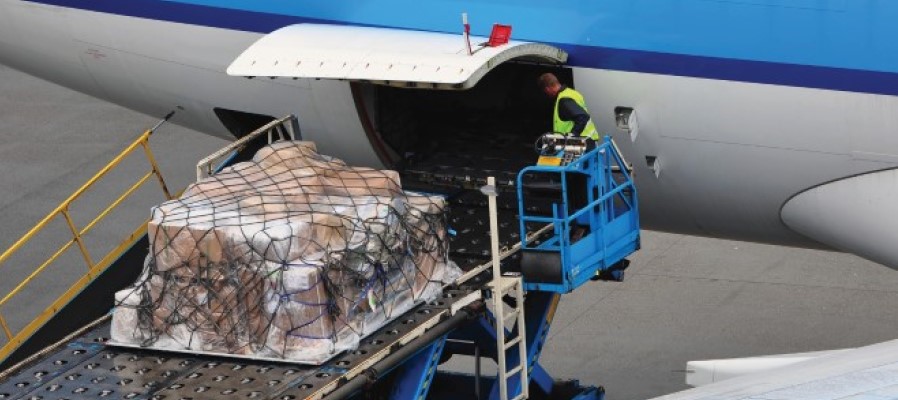🕒 Article read time: 2 minutes
Air freight’s role in global logistics

The logistics industry has experienced a series of seismic shifts in recent years, including Brexit, a chronic skills shortage, the COVID-19 pandemic, supply chain disruption and now spiralling fuel prices, exacerbated by the war in Ukraine.
These events have impacted on all modes of transport. Despite this challenging set of circumstances, however, the air freight sector has proved remarkably resilient and reliable.
FROM PASSENGER JOURNEYS TO CARGO-ONLY FLIGHTS
Despite the cancellation of many passenger flights because of COVID-19 travel restrictions, cargo-only movements increased during the pandemic – some airports reported a 400% increase in cargo movements in early 2020 – although restrictions in passenger flights reduced available capacity overall. Prior to the pandemic, bellyhold cargo at Heathrow accounted for around 60% of UK air freight volume: however, with the reduction in passenger flights, overall capacity shrank by 25% in 2020, when compared to 2019 levels.
“Yet despite this challenge, throughout the initial pandemic period, and since, the air freight sector has continuously stepped up and provided vital supply chain continuity at a time where other modes of transport were heavily impacted and unable to move goods to their destinations,” said Alexandra Herdman, Public Policy Manager, Logistics UK.
AIR FREIGHT PIVOTAL TO POST-PANDEMIC RECOVERY
As the global economy recovers post-pandemic, air freight will be pivotal in supporting the UK’s economic recovery, acting as an enabler for British firms striving to reach the UK’s £1 trillion a year export target by 2030. This will be especially critical as the UK government seals new trade deals with nations across the globe in the post-Brexit world. And the shift to air freight is already under way: in 2021 Heathrow moved 1.4 million tonnes of cargo and East Midlands – the UK’s largest airport for EU and domestic cargo movements – moved 423 thousand tonnes. This is a significant increase from 382 thousand tonnes in 2020, thanks to air freight’s reliability and speed of turnaround, particularly when shippers were faced with delays at sea due to the closure of ports across the globe and the blockage of the Suez Canal and road haulage faced some challenges caused by global HGV driver shortages.
AIR FREIGHT PROVES A FAST AND RELIABLE ROUTE TO MARKETS
The logistics industry is highly complex and faced a number of significant issues to bring goods to market in 2021. As a result, many companies explored alternative methods of shipping to mitigate challenges within their existing supply chains, with an increased number of businesses choosing to use air freight as a fast and reliable way to transport goods in the lead up to the 2021 festive season. In November 2021, the Daily Telegraph reported that the air cargo sector was “booming” as a result of the ongoing issues with global shipping supply chains, with air freight prices two-and-a-half times higher than pre-pandemic levels.
However, with logistics businesses typically operating on very narrow profit margins – around one per cent – and, with rising inflation, higher energy prices and the average fuel price reaching the highest level on record, it is questionable as to whether businesses will be continuously able to absorb the additional costs of air freight, over other transportation methods, in the long term.
WAR EXACERBATES ENERGY PRICE CRUNCH
Cost and affordability could also be further impacted by the current war in Ukraine, which poses some challenges to the aviation sector. As well as access to Ukrainian and Russian airspace becoming minimal to non-existent for operators from many countries across the globe – causing flights to be diverted south while also trying to avoid ongoing restrictions to airspaces in the Middle East – the war has led to a sharp increase in the cost of jet fuel (kerosene). For the week ending 4 March 2022, jet fuel cost $1119 per tonne – an increase of 28% from the previous week, and a 45% increase since beginning of 2022; a costly increase for businesses and operators already looking to recover from financial burdens caused by the COVID-19 pandemic.
DECARBONISATION CHALLENGE
As well as increasing costs, the role aviation plays within the overall logistics industry, across all transport modes, could be affected by efforts to decarbonise. Since the UK’s target for achieving net-zero emissions by 2050 was set in 2019, all areas of the logistics industry have accelerated efforts to decarbonise. Businesses are increasingly looking into creating sustainability plans that are practical for their operations, and while new planes are much more fuel efficient, many airlines such as British Airways and EasyJet are already supporting carbon offsetting projects. While the use of sustainable aviation fuel is increasing, there is currently no one-size-fits all solution for aviation. Industry now eagerly awaits the release of government’s Aviation Strategy, due to be published soon, which it hopes will set out a clearer path to decarbonising aviation and allow businesses to investigate how the use of air freight could fit within their sustainability plans, while ensuring they are on track to meet industry and government targets.
Overall, air freight services contribute significantly to the UK economy, with some £87 billion of GVA (Gross Value Added) depending on air freight exports.
“The role of air freight throughout the pandemic must not be under-estimated,” Herdman said. “When fast and reliable transport was required for vital goods such as PPE and vaccines, the sector stepped up. Following its highlighted reliability, many more businesses looked to air freight as a solution, not least because of its speed of delivery. However, with rising costs a concern, it will be interesting to see whether this volume of cargo remains in the air, or whether operators shift back to traditionally cheaper modes of transport – air freight operators will need to consider promotional opportunities, loyalty bonuses and other incentives to keep customers engaged with the sector if it is unable to compete solely on price.”
*www.logistics.org.uk/air
Published On: 26/05/2022 16:00:08

Comments Section
If you are a Logistics UK member login to add comments.